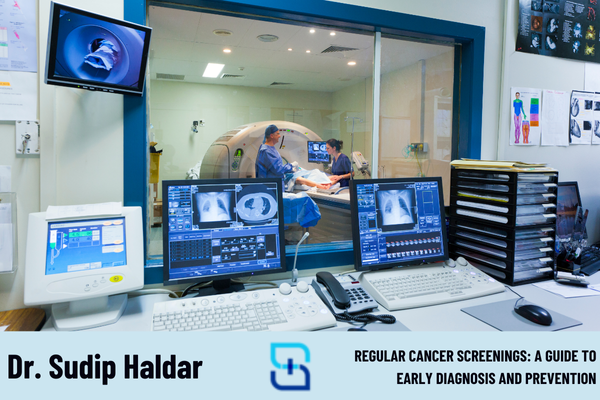How Genetics Influence Cancer Risk: Understanding the Role of Hereditary Factors
How Genetics Influence Cancer Risk: Understanding the Role of Hereditary Factors with Dr. Sudip Haldar Cancer is often seen as a disease influenced by lifestyle and environmental factors, but genetics also play a significant role in determining an individual’s risk. Certain gene mutations passed down through families can increase susceptibility to specific types of cancer. In this blog, Dr. Sudip Haldar, a renowned expert in oncology, explains how hereditary factors influence cancer risk and what steps individuals can take for early detection and prevention. 1. Understanding Hereditary Cancer Risk Hereditary cancer occurs when a genetic mutation is inherited from one or both parents. These mutations are present in every cell of the body and can increase the likelihood of cancer developing at an earlier age or in multiple organs. Common Hereditary Cancer Syndromes: Dr. Haldar explains that 5-10% of all cancers are caused by inherited genetic mutations, making awareness and early intervention essential. 2. How Do Genetic Mutations Cause Cancer? Genes control how cells grow, divide, and repair damage. Mutations in specific genes, such as tumor suppressor genes (e.g., BRCA1, BRCA2, TP53), disrupt this balance, allowing abnormal cells to grow uncontrollably and form tumors. Dr. Haldar emphasizes that not all mutations cause cancer, but certain inherited mutations significantly increase risk. 3. Identifying Your Genetic Risk Early identification of hereditary cancer risk is crucial for prevention and management. Genetic testing and counseling are valuable tools in assessing an individual’s predisposition to cancer. Who Should Consider Genetic Testing? Dr. Haldar advises individuals with a family history of cancer to consult with a genetic counselor or oncologist for a thorough risk assessment. 4. Preventive Strategies for Hereditary Cancer While genetic predisposition cannot be changed, proactive measures can reduce cancer risk or enable early detection: A. Regular Screenings and Checkups B. Preventive Surgeries C. Lifestyle Modifications Dr. Haldar underscores that knowledge is power, and these preventive steps can dramatically reduce cancer risks. 5. The Role of Genetic Counseling Genetic counseling is a critical part of managing hereditary cancer risk. Genetic counselors and oncologists: Dr. Haldar recommends that families with hereditary cancer syndromes seek regular counseling sessions to stay informed and proactive. 6. Advancements in Genetic Research and Cancer Treatments Modern oncology has seen groundbreaking advancements in understanding and managing hereditary cancers: Dr. Haldar believes that continued research in genetic oncology holds the key to more effective, personalized cancer treatments in the future. 7. Final Thoughts from Dr. Sudip Haldar “Understanding your genetic risk for cancer is not about fear—it’s about empowerment and taking control of your health. With genetic testing, preventive measures, and personalized care, we can significantly reduce cancer risks and improve outcomes.” Dr. Haldar encourages everyone with a family history of cancer to take the first step: consult a specialist, get tested if necessary, and adopt preventive measures to stay one step ahead. Take Control of Your Health Today If you or a loved one is concerned about hereditary cancer risk, schedule a consultation with Dr. Sudip Haldar. Together, you can create a personalized plan for prevention, early detection, and treatment. Stay informed. Stay proactive. Stay healthy.
How Genetics Influence Cancer Risk: Understanding the Role of Hereditary Factors Read More »


